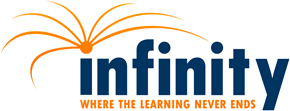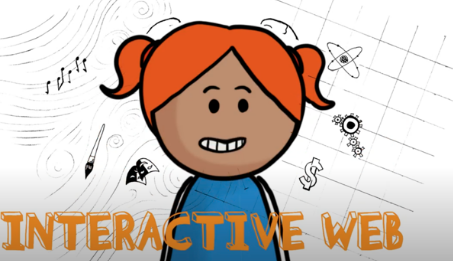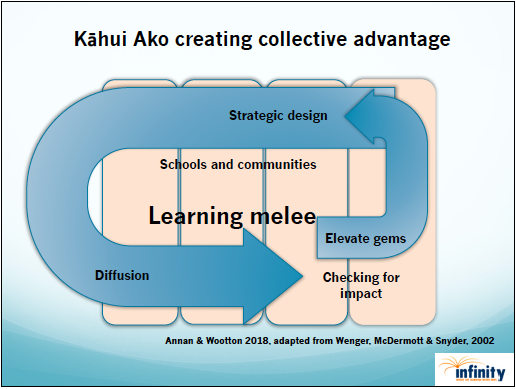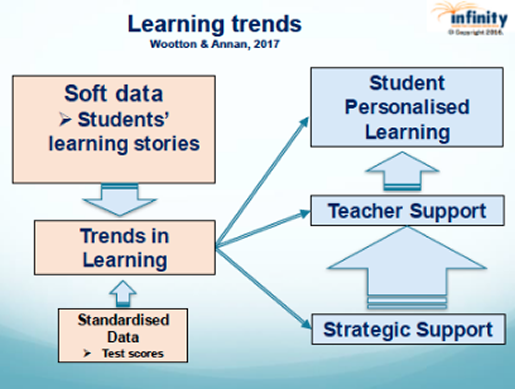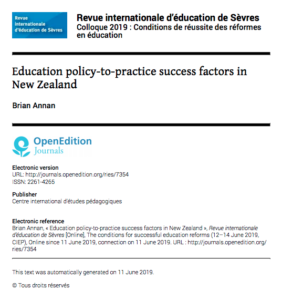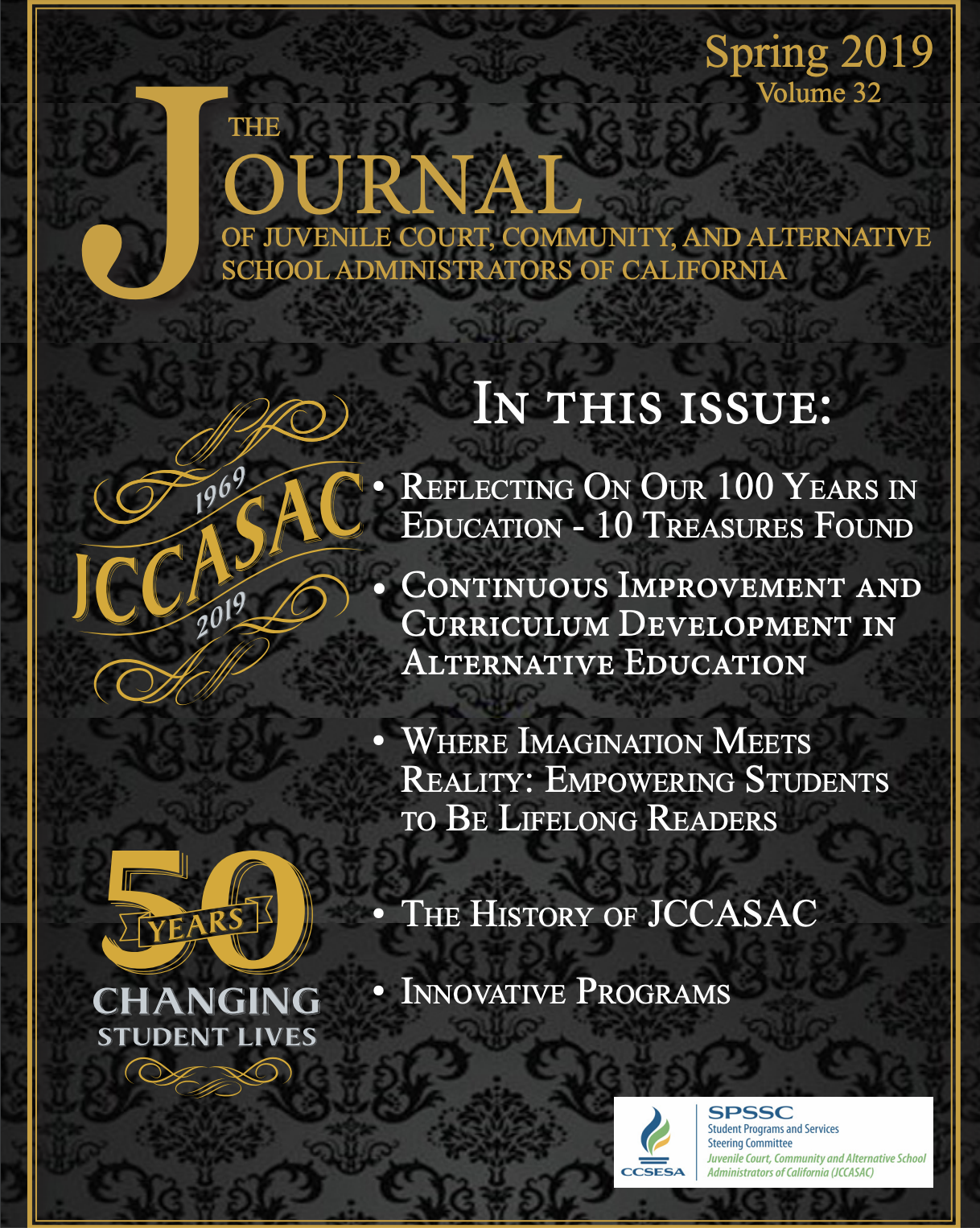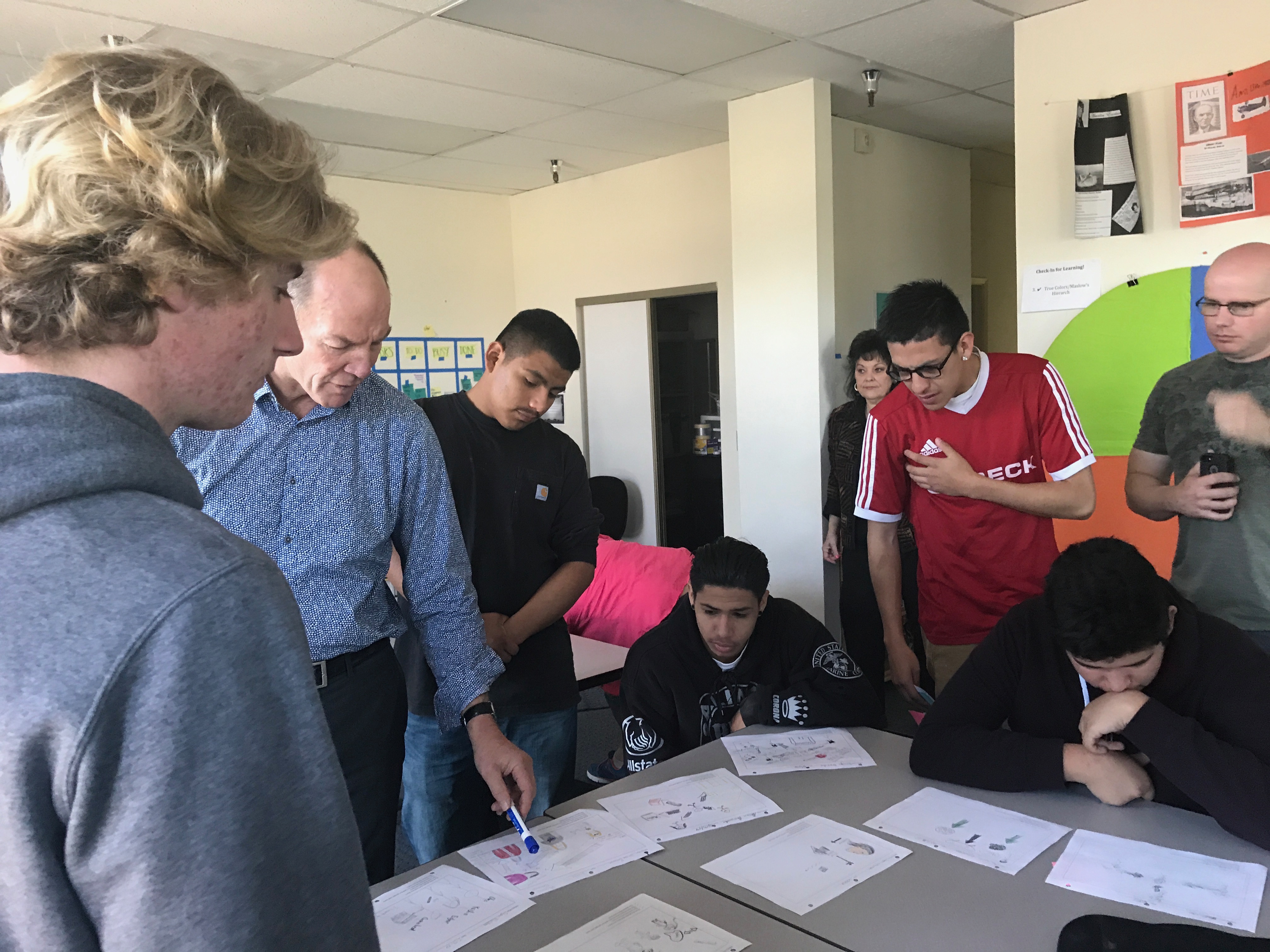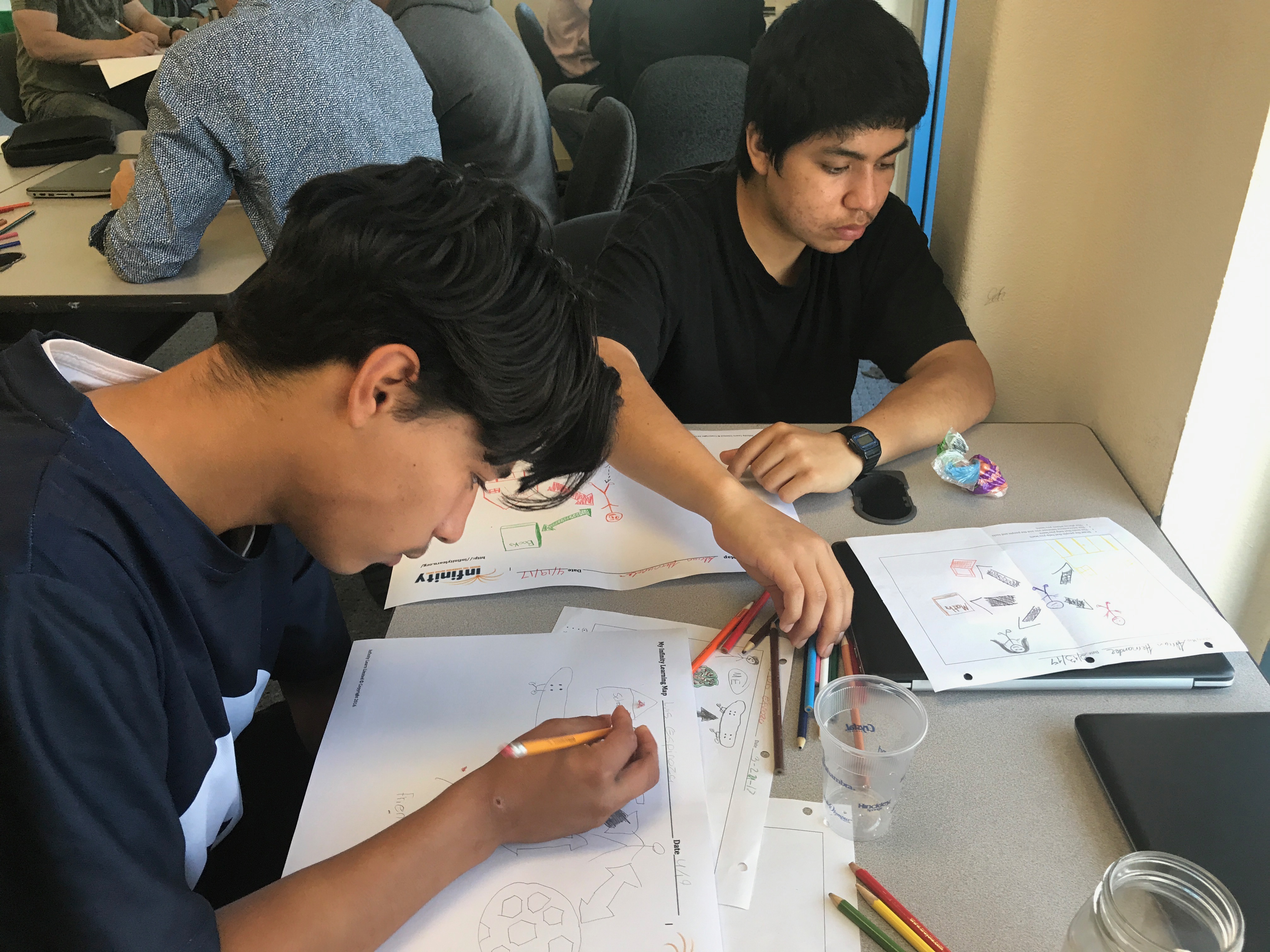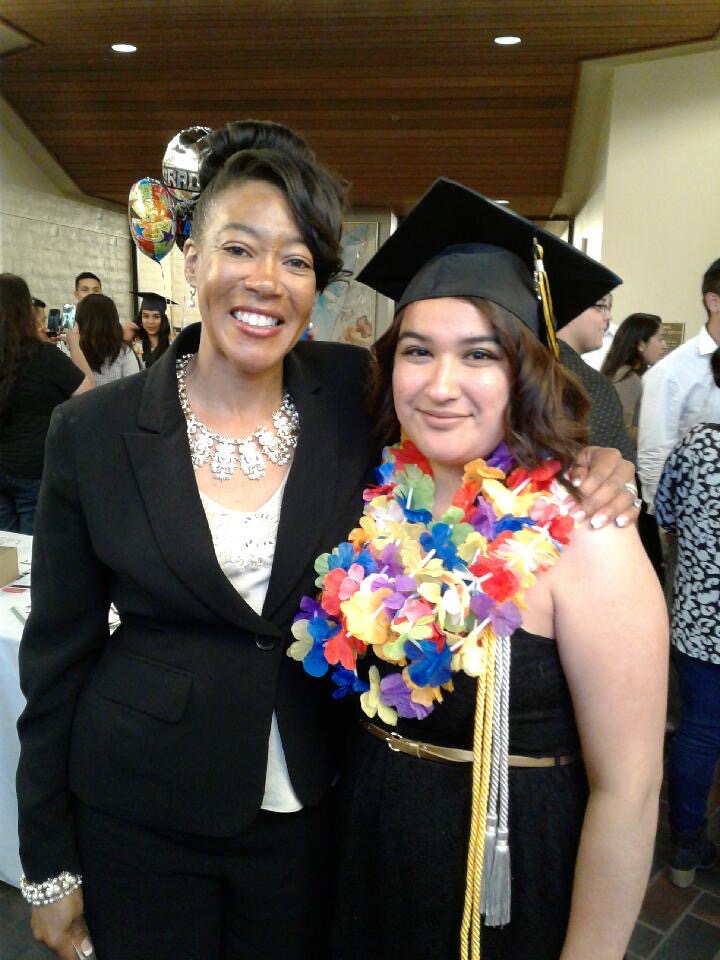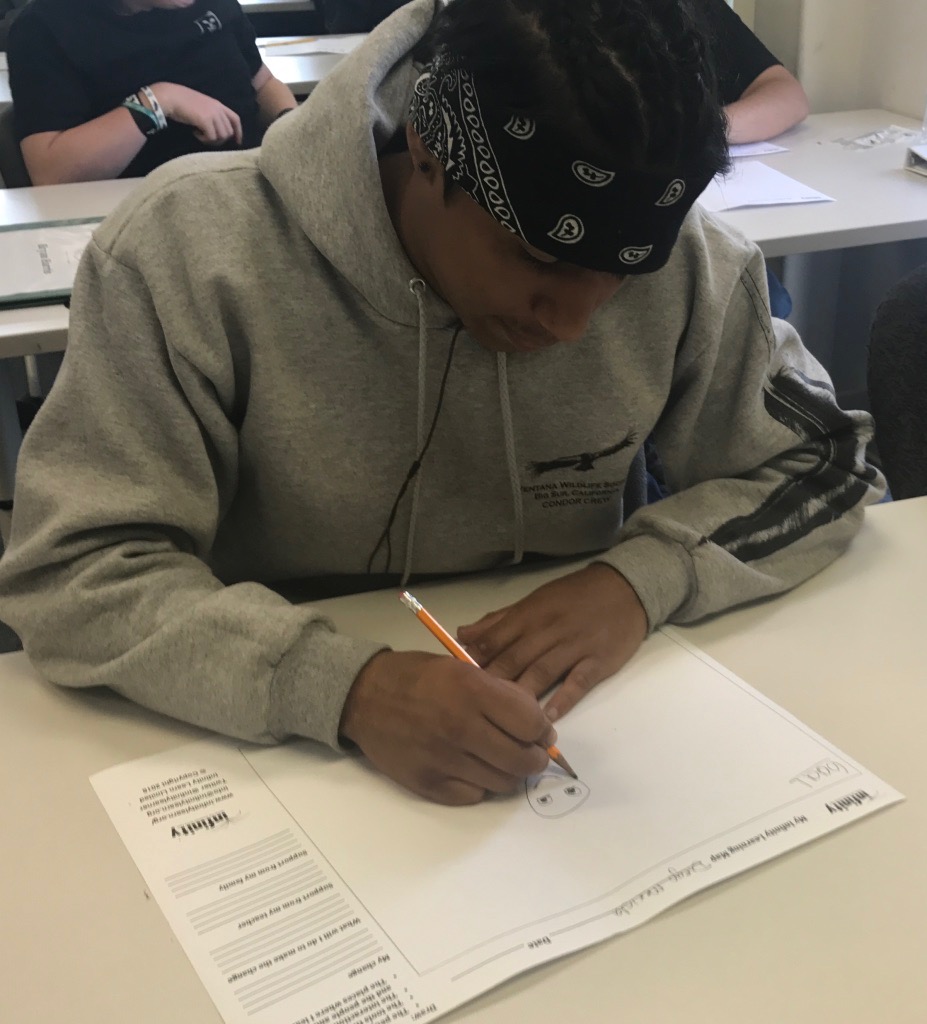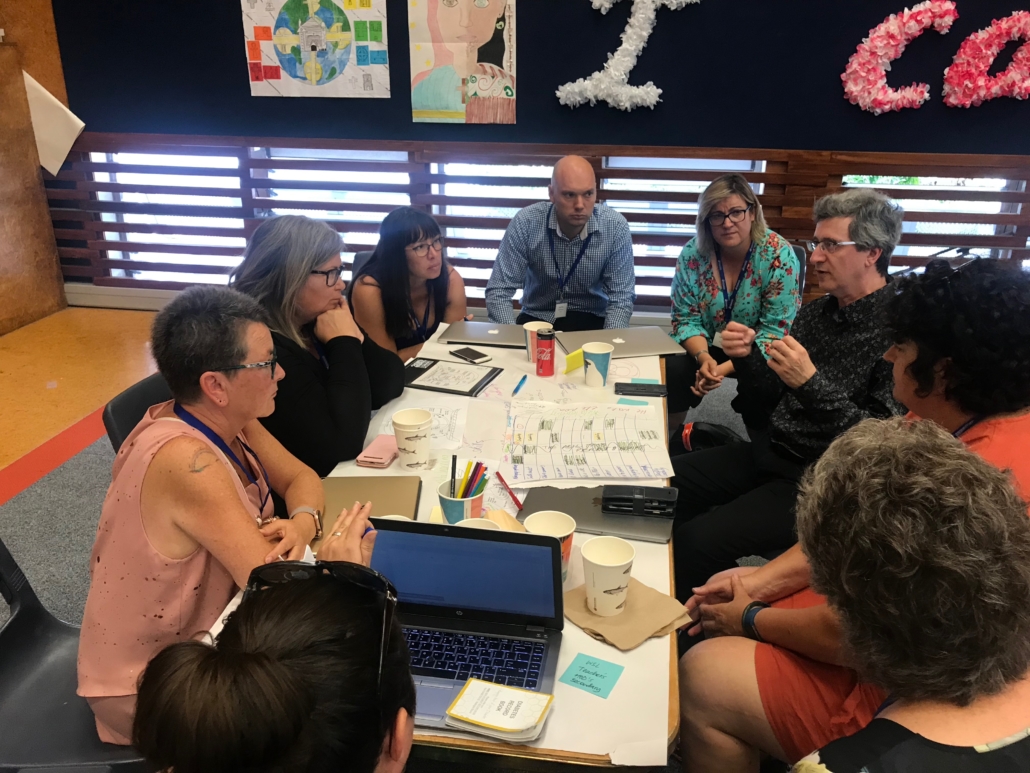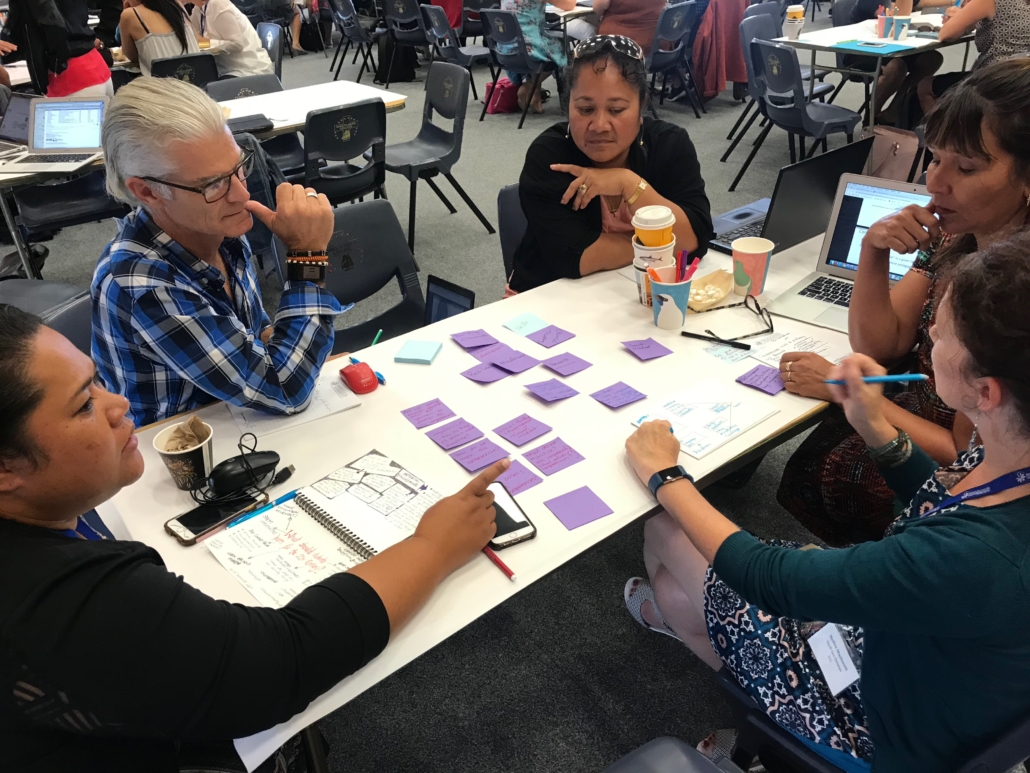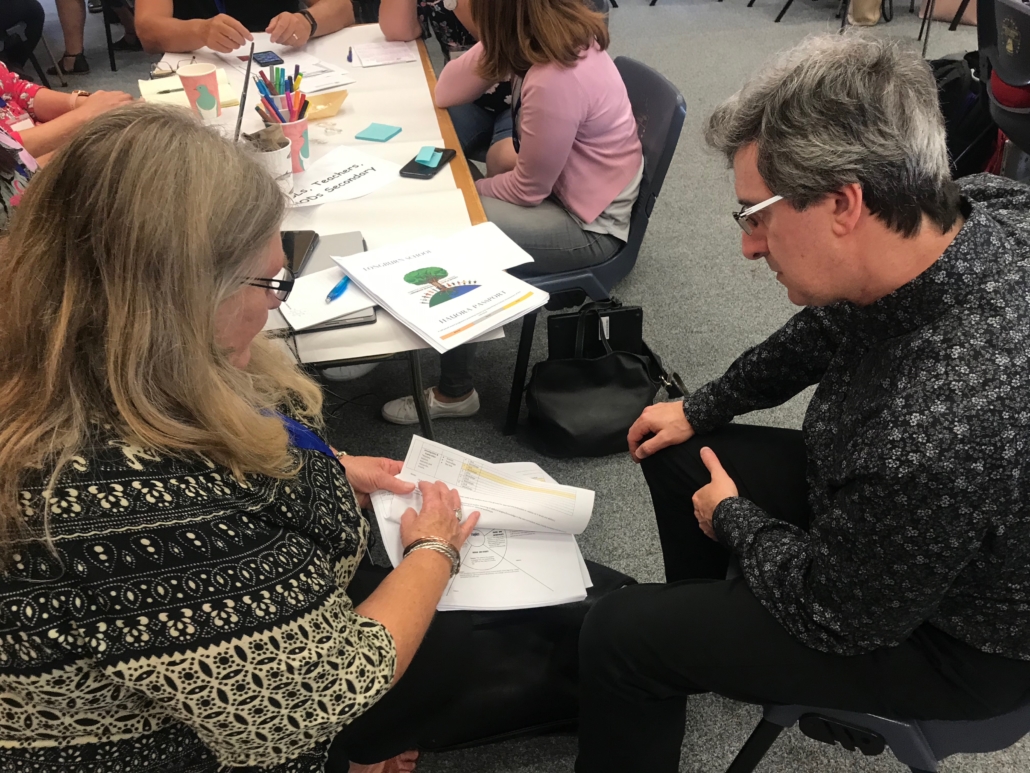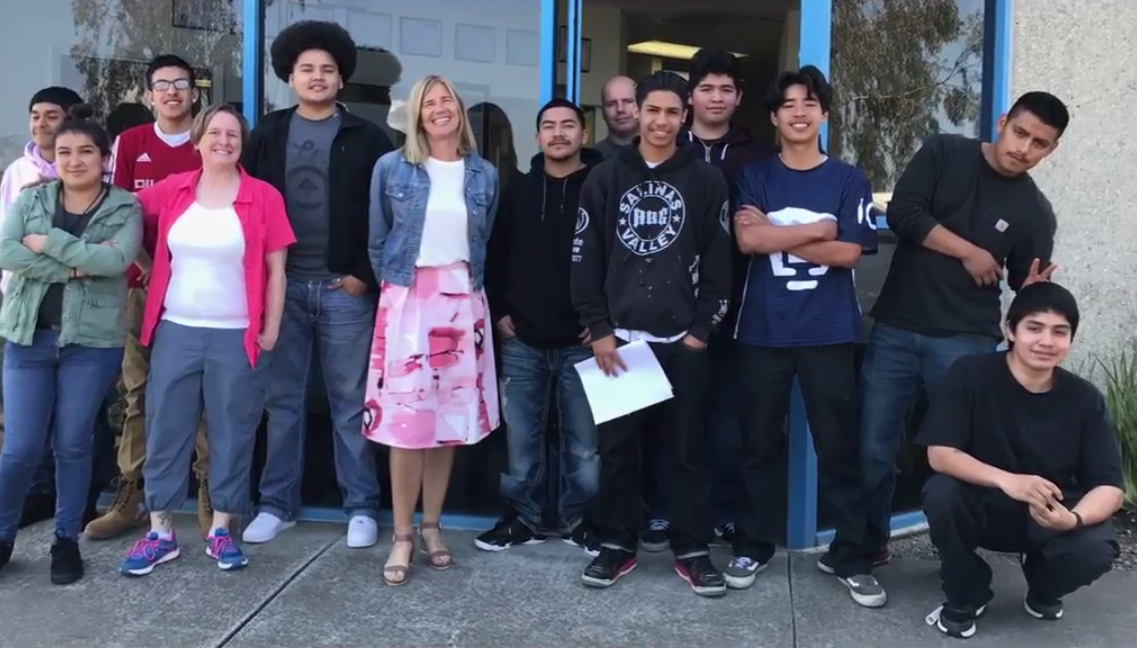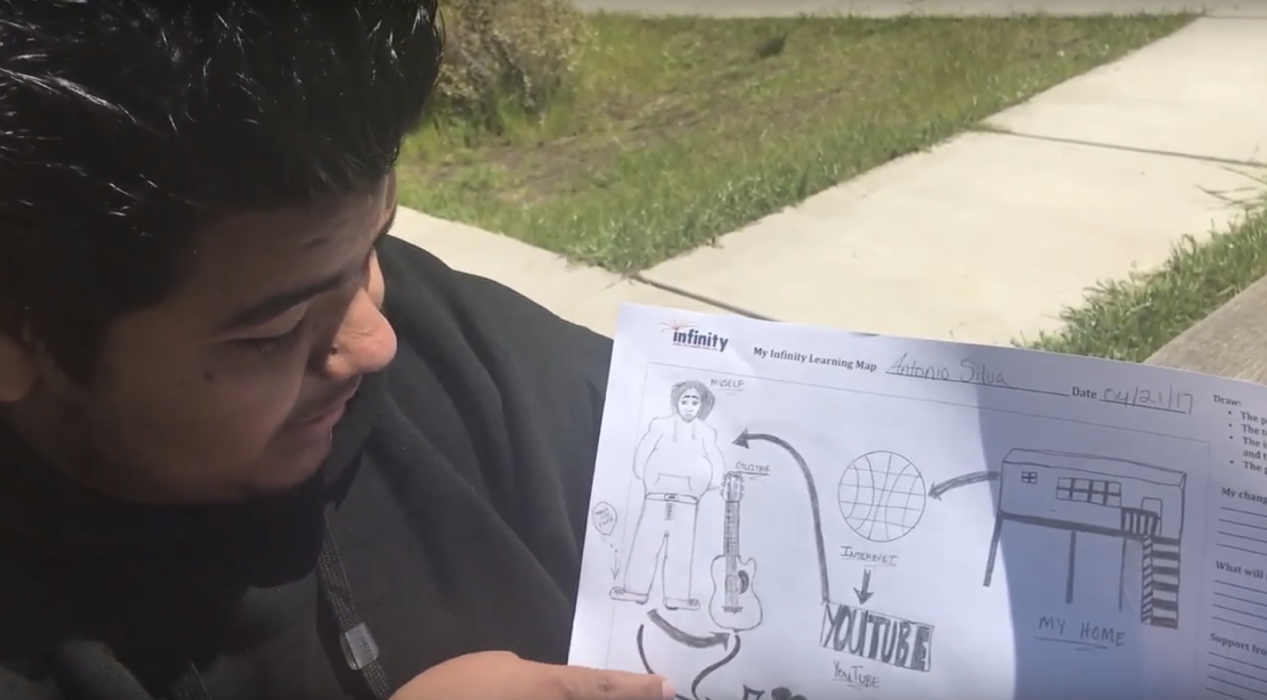OVERVIEW
Infinity Learning Maps
Approach
Infinity Learning Maps provide a practical approach for teachers and parents to support students in fun and energising ways to analyse and improve their learning.
The approach merges the three sciences of learning-how-to-learn, teaching and positive psychology. Teachers support students to draw pictures of how they see their interactions surrounding a learning situation. Students then create data sets from the pictures and analyse their data to identify areas for improvement. These activities assist students to sort out relevant ideas buzzing around in their minds to the interactive web surrounding their learning. Go to this link to get a basic idea about what we mean by the interactive web:
Research by Annan, Annan and Wootton (2016) found that the linked activities of drawing, analysing and making changes to current learning situations typically,
- lifts student confidence and achievement, and
- motivates teachers and parents to rethink their respective support roles.
There are now many positive stories about Infinity Learning Maps supporting: students to improve their learning; teachers to alter their practices; leaders to strategise based on student’s perspectives about learning; and, parents to support their children
Theory
Theory underpinning the Infinity Learning Maps approach encourages teachers to view ALL STUDENTS AS SUCCESSFUL LEARNERS in the mapping activities.
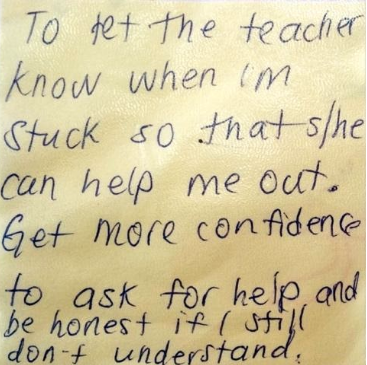
Children love discovering that they are capable. They also love it when caring adults reinforce that discovery. They immediately feel more confident when their teachers, parents and other supporting adults acknowledge them as capable. Children who experience love, safety and security from their supporting adults and who feel confident in themselves typically succeed in academic learning (Parrett & Budge, 2012). The Infinity Learning Map’s approach is a way of manufacturing an arrangement in which supporting adults become closely associated, or ‘joined-at-the-hip’ as some teachers term the phrase, with their children in their learning journeys.
Is every child capable? Yes! Every child who starts school is capable in their unique way. However, those signs of capability can get lost as children progress through their formal schooling system. System-wide attempts to lift academic achievement globally have resulted in some children being seen as capable and others considered ‘not-so-capable’ in learning. Not-so-capable children have been given a range of politically charged labels over time; ‘At Risk’, the ‘Tail’, ‘Priority Learners’, ‘Below National Standards’.
Every child has a script in their mind about them as a learner. Irrespective of the intent of those not-so-capable labels, most of those students know and feel the script that has been written for them. They typically learn in line with that script, not because they want to but because the schooling system takes over and crafts how they will learn. Their needs and gaps are identified for them. Teaching professionals then build their knowledge and skills to meet those needs and close the gaps. Although this system-wide approach is well-intentioned for the ‘not-so-capable’, the results are generally underwhelming; a few children rise up the ladder but many only make small gains and experience disappointing plateaus throughout their years at school.
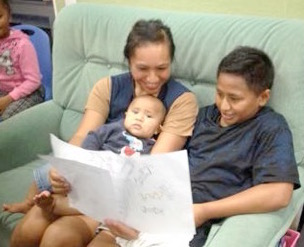
Our belief is that it is possible for ‘deficit scripting’ to be turned around but not by decisions made at the top-end of large systems.
A change in a system tends to build on what is already in place (Fullan, 2016). Additionally, top-down change takes a long time to transform anything. Decisions made by the students, their teachers and parents are more likely to encourage confident learners and accelerate academic achievement.
A school leader comments: https://youtu.be/ecyWNdY4yXA.
It is imperative that decisions are made with a strong belief in the capability of every child. Students need to hear that belief, feel it, and know that their new-found belief in their capability is there for the long term.
It is here that positive psychology comes into play.
The quote below summarises our view of how positive psychology can be used in the intervention space to activate student agency and engagement in learning:
“Positive psychology concerns the lens used to select the features of any situation and the processes by which we make meaning from what we perceive. It leads us to appreciate what does work, what is valued and what conditions are desirable for learning to occur (see Annan & Priestley, 2012; Edwards & Holtz, 2007; Nickerson, 2007). The positive psychology movement, initiated by Seligman and Csikszentmihalyi (2000), has encouraged the creation of optimistic climates for change by placing emphasis on presence rather than absence. Fullan and Langworthy (2014) suggest that schools build on the “pockets of educational innovation’ that are exciting students into learning.”
p.13. Annan, Annan, Wootton, & Burton, 2014
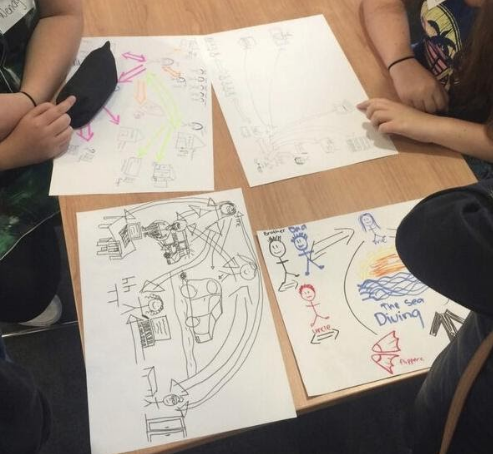
Our positive and appreciative approach towards strategy design does not ignore problems, challenges and gaps that children have in their learning and living. Difficulties in learning are dealt with but the emphasis is on students taking greater responsibility by using their strengths to address challenges.
Our view of successful learners is that there are no priority learners, no average learners and no gifted learners. Rather, every student can get stuck in mud, can be ordinary and can do something amazing on any given day.
As students become more active in their learning, teachers and parents can provide more personalised support. A central question to activate students is to ask, “What are you going to do differently to improve this situation?”
A school leader reflects: https://youtu.be/1tYdm25Xlps.
Typically, children are not asked to answer that question. Our research is finding that Infinity Learning Maps help to turn on the ‘learner agency tap’ inside children’s heads. This internal tap makes students far more active, connected and aware of the way they are learning and interacting with the world around them.
There are now many Infinity Learning Maps stories about children, with support from teachers and parents, re-scripting the way they learn-how-to-learn. Examples range across academic challenges, English-language challenges, replacing negative behaviours with positive behaviours, succeeding with visual and hearing impairments, engaging in passion learning adventures, project-based learning, addressing sporting challenges and many more.
Introduce Infinity Maps to your children and watch them map out their current learning situations, then address challenges in their own ways. Watch how they re-script the way they see themselves as learners.
Infinity Learning Maps are engaging both English and indigenous Māori medium teachers. One teacher of new entrant students, Papa Bill from Tolaga Bay region, New Zealand, shared his views in this video about the value of the approach after attending a series of workshops to learn about Infinity Learning Maps. An English translation is provided below.
Benefits of Infinity Learning Maps
“The benefits of these learning maps is that you see the depth and breadth of the students’ thinking. It is not just pertinent to one particular curriculum area but to all areas of learning in all aspects of a child’s life; school, marae, home wherever he or she may roam. I thought I knew my students well, but through the mapping process I have seen that the students have their own rich connections to their friends and whanau. These are made explicit through the mapping process. It has been new learning for me to see the value of these connections and how to reinforce existing strong connections and strengthen weak connections. It was humbling to see that I was not existent in some of the maps, I’m not concerned because it is how each individual student views their learning pathways. Once the maps have been drawn the students record their explanation of their map and I have been in awe of how confident and clear they are about their learning pathways and connections. Each child has a voice that is worth listening to.”
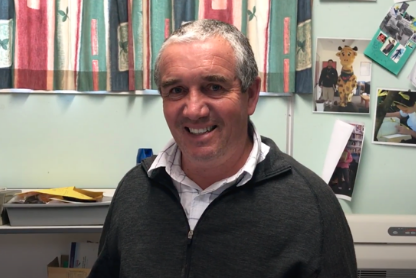
Papa Bill, Tolaga Bay, 2016.
ACHIEVEMENT CHALLENGE TO LEARNING FRAMEWORK
Learn how to shift the mindset from fixing ‘achievement challenges’ for targeted students to creating a ‘learning framework’ that identifies relevant learning for an entire community. A learning framework acknowledges that learning has its ups and downs for all community members. When there are downs in learning, the community uses its strengths to support those that need a hand up to get moving.
COLLECTIVE ADVANTAGE
Collective advantage is a concept that encourages collaboration in challenging circumstances. The concept from the business world provides a picture of how Kāhui Ako can function in ways that all schools and surrounding communities can benefit from pockets of stunning practice that exist right in front of their own eyes. It is about finding the gems, designing ways to spread those gems and diffusing the gems across the community.
EVALUATING EFFECTIVENESS
Analysing data has become a gold star component for making claims of effectiveness in learning. Hard data, mainly test scores, has typically been used as high-status information to make next-step learning decisions over the past few decades. Soft data, or narratives of student’s learning stories, is now growing in status because the use of storying is engaging kids who would otherwise opt out of a test-score environment. A significant task for teachers and leaders in Kāhui Ako is get the evidence-balance right.
This article is called Education policy-to-practice success factors in New Zealand. It was published in Revue internationale d’éducation de Sèvres, The conditions for successful education reforms (12–14 June 2019, CIEP). This article was written to contribute to an international conference about successful reforms hosted at CIEP in Sevres, Paris in June 2019. The abstract reads: New Zealand education system’s leaders have learned to dialogue with the people to get things done. This policy-to-practice success factor has contributed to improved local governance and management, a world-class curriculum and a strong commitment to appreciating identity and dual heritage through the Treaty of Waitangi. Now New Zealand leaders are in dialogue with the people to re-imagine success in education. A new policy called Communities-of-Learning – Kāhui Ako – is an avenue to activate the new success. The New Zealand presentation at Workshop 2 will reveal some of the early collaborative successes, such as the value of community-designed learning frameworks, collective advantage across schools and tracking learning trends.
Download Publication
Purchase e-Guide Resource
Grow student agency! Develop personalised learning! Grow student’s confidence in learning how to learn! Purchase e-Guide Resource for Infinity Learning Maps and have access to this innovative tool that looks at learning from a student’s perspective! The e-guide includes six interactive sections Overview, Genesis, Theory, Trends in Learning, Five Practical Steps and Research. Over 50 illustrated pages with embedded links to support videos, templates and frameworks.
Student Learning Plans in Monterey County, California, USA
Are you stuck in the past, or actively thinking about new ways of engaging children and young adults in relevant learning for the future? This article profiles the outstanding efforts of educators, students and families in Monterey County to create relevant learning for the future. Case studies of students are positively profiled in a range of alternative education settings across the Country. Key themes weaved into the article to help make learning more relevant for the future include: Student Learning Plans, Positive Learning Stories and Learning Trends. These ideas challenge past ways of planning, implementing and evaluating learning for students in challenging circumstances. Have a read, reflect on your practice and enjoy making a positive contribution to kids lives for the future.
CREATING A NEW SUCCESS, was the latest event in a series for school, community and Ministry of Education leaders to consider relevant learning for children and young adults going into the future. Infinity Learn Ltd designed the series of events with support from the Ministry of Education, to stimulate collegial conversations and positive action among the leaders and out into communities across New Zealand.
This latest event provided participants an opportunity to engage with Charles Fadel, https://curriculumredesign.org/about/team/, a global education leader and Harvard scholar. A priority message from Charles is that countries around the world, including NZ, need to accelerate their thinking and action about more relevant learning, living and success. Participants were encouraged to consider the global trends then discuss with colleagues the implications for their communities. One participant’s reflection represented many at the end of the event, “It has created a sense of urgency that it’s time to make some changes so we can makes things more relevant for our students.” The next event delves into responsibilities of teachers, students and whānau in learning. Questions surround agency re-adjustment within all three groups to address teacher overload, passive students and bewildered parents.
Creating a New Success
If you are part of a Kāhui Ako, you do not want to miss this!
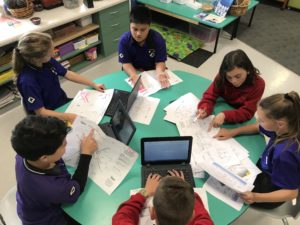 As we approach the third decade of the 21st century, we are questioning traditional notions of success. Create new narratives of success in learning and living for your students now.
As we approach the third decade of the 21st century, we are questioning traditional notions of success. Create new narratives of success in learning and living for your students now.
Learning, living, and success; we find ourselves in a swirl of perspectives about those three big ticket-items. Current thinking about education differs greatly from the straightjacket views that prevailed as we entered the 21st century. Practices that were once certainties are now cast in the air.
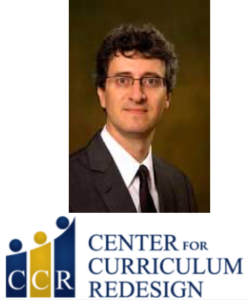
We try new approaches and add new items to curricula while the shadow of 20th Century teaching and learning lingers. We are faced with decisions about what activities to retain from the past, while mindful that there are also areas of which we must let go.
Kāhui Ako has created a community-centred environment for dialogue about a new of success in learning and living. That dialogue is best informed by a balance of knowledge exchange within your community, with other communities around New Zealand and with the abundance of expertise around the world. Through carefully balanced input, the way forward becomes clearer, doable, engaging.
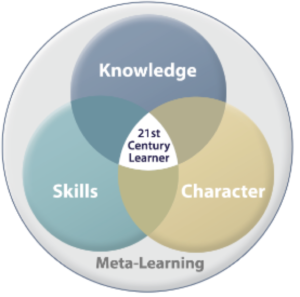 Within Kāhui Ako, leaders ask about relevant learning competencies for better futures.
Within Kāhui Ako, leaders ask about relevant learning competencies for better futures.
- What Knowledge, Skills and Character qualities matter for an age of Artificial Intelligence?
- What are the hard choices to make?
- How should we readjust content, pedagogical and learner focus?
- What are the responsibilities of teachers, students and parents in learning?
Take this opportunity to engage with Charles Fadel,
https://curriculumredesign.org/about/team/#charles, global education leader and Harvard scholar, to accelerate your thinking as you work through these important leadership questions.
“If we are not careful, we risk causing more of a mess by holding on to too many outdated content areas. We need crisp, clear frameworks and well-designed competencies at large,” Charles Fadel, October 2018, in a personal communication.
One way to engage with Charles’s work is to read the book: “Four-Dimensional Education”, (Fadel, Trilling & Bailik, 2015) an organising framework comprising Knowledge, Skills, Character and Meta-Learning.
Here is a video about working together to grow capability.
http://www.oecd.org/edu/schooling-redesigned-9789264245914-en.htm
Infinity Learn Ltd directors Dr Brian Annan and Mary Wootton feature in this video as the lead design and facilitation experts for the highly successful Learning and Change Networks strategy. Mary also went on to support Science LCN networks. OECD studied the LCN strategy as part of the Innovative Learning Environments Project and included information about it in the publication: “Schooling Redesigned Towards Innovative Learning Systems.”
Another way to engage with Charles is to attend the next Leaders Forum in Auckland on 6th and 7th March, 2019, http://bit.ly/registrationleadersforum.
Kāhui Ako leaders’ forums have, to date, concentrated on purpose and the many good reasons to collaborate. The forums have considered the ‘what’ and ‘how’ of learning frameworks and facilitated sharing of information across Kāhui Ako. We now welcome the opportunity to extend our connections to the global world of information about teaching and learning in our current and future worlds.
Charles Fadel is offering us the opportunity to accelerate our collective thinking about more relevant learning, living and success in NZ communities. He has worked in over thirty countries and jurisdictions, and has presented keynotes and addresses at organizations as diverse as OECD, the World Bank, UNESCO, Google, Gates Foundation, and many others.
Find out more about Charles Fadel’s work through the following links.
- A global education thought leader and futurist, author and inventor, with many active affiliations, https://www.youtube.com/watch?v=telJ8yDCtBg.
- Research by Fadel’s Centeris the cornerstone of the OECD 2030 Learning Framework, https://www.youtube.com/watch?v=MYLDXaqjaDQ.
- Notably, the New Zealand Qualifications Authority is a member of Fadel’s Center Assessment Research Consortium, https://curriculumredesign.org/assessment-research-consortium/.
- Relevant Learning Competencies for better futures, http://bit.ly/makinglearningmorerelevant.
Be on the front-edge of the wave; step back, reflect and adapt now as we progress further into the 21st Century.
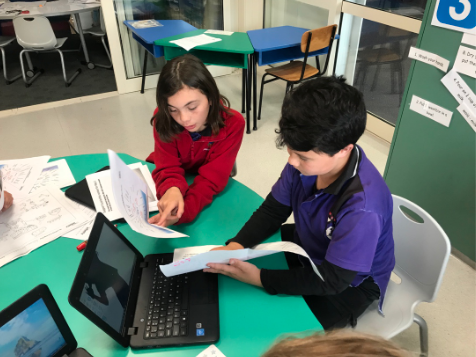
Infinity Learning Maps draw out and improve each student’s unique web of interactions surrounding their learning. The students draw their Infinity Map about the people, tools, places and interactions that help them learn. They then analyse their maps and decide on change that will improve their current learning situation. They then decide what will THEY do differently to make the change and what support they need from their teacher and family. Watch here to see how Infinity Learn supported students in alternative education Salinas, California. Find out more from the Infinity Learning Maps e guide http://bit.ly/
